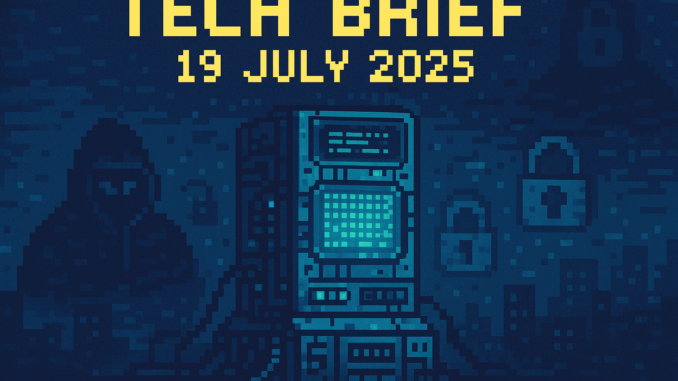
In a Bristol data centre, a new supercomputer hums to life, drawing enough power to light up a small town. Tech Brief, 19 July 2025, brings together the latest advances and risks shaping the UK’s digital backbone, from Bristol’s new AI supercomputer to critical security threats and the next leap in AI assistants. We all know how far infrastructure and automation have come, yet those familiar vulnerabilities still linger.
UK’s Most Powerful Supercomputer Activated for AI Research
It starts with a flick of a switch and a hum that could power a street of 80s terraced houses. Isambard-AI, the UK’s most powerful supercomputer, was unveiled in Bristol by Technology Secretary Peter Kyle. Housed in 212 cabinets, this system leverages next-generation Arm processors and NVIDIA Grace Hopper Superchips. It is as if every school’s BBC Micro suddenly joined forces, only now they are running climate models and AI, not just LOGO turtles. The system’s architecture, detailed in public technical specs, enables researchers to run large language models, climate simulations, and genomics workloads at unprecedented speed. For the UK’s AI sector, this is a critical moment: access to world-class compute is now on home turf, reducing reliance on overseas data centres. Let’s not forget Sophie Wilson, whose early work on Arm architecture now powers this national leap forward. The move signals a shift from fragmented regional clusters to a coordinated national infrastructure, setting a new benchmark for domestic research.
NCSC Links Fancy Bear to Major Malware Attack on UK Infrastructure
The NCSC raised the alarm on 18 July, linking a sophisticated malware campaign to Russia’s GRU-backed Fancy Bear group. The “Authentic Antics” framework targeted critical infrastructure, using credential harvesting and stealthy backdoors. These are methods that would have felt at home on a 1990s IRC channel, but with far greater reach (and, sadly, no ASCII art). The NCSC’s technical report outlines how the malware evaded standard detection, exploiting legacy systems and weak authentication protocols still found in public sector networks. The timing coincides with new UK sanctions against Russian intelligence units; underlining the geopolitical stakes. For security professionals, this is a reminder that the arms race between attackers and defenders is as relentless as ever. The incident also highlights the perils of running old, unpatched kit, a lesson as true for modern cloud servers as it was for those battered Pentium towers under your mate’s desk.
OpenAI’s New Assistant Automates Tasks but Skips the EU
OpenAI’s latest release is not just another chatbot. This AI agent books tables, shops online, and wrangles files and spreadsheets without human intervention. Announced on 17 July, the assistant integrates directly with web browsers and local files, letting users delegate complex digital chores. Availability, however, stops short of the EU due to regulatory hurdles. According to OpenAI’s official documentation, the assistant can automate workflows previously requiring manual scripts or third-party plugins. We all remember the satisfaction of automating a tedious task, whether with a Lotus 1-2-3 macro or a Windows 95 batch file. The promise here is the same: more power, less tedium, but on a whole new scale. For UK businesses, the tool could streamline operations, but the EU’s absence from the launch highlights the regulatory fault lines shaping the global AI market. The difference now is scale and autonomy; this assistant acts independently, raising new questions about trust and oversight.
DWP Faces Scrutiny Over Secretive AI in Benefits System
Imagine being told by a faceless system that your benefits are “suspicious”, and not knowing how or why. For claimants, it is a scenario that feels all too real as the Department for Work and Pensions quietly rolls out AI algorithms behind closed doors. Reports from Amnesty International and Big Brother Watch, published 18 July, accuse the DWP of using “unchecked” systems that may reinforce bias and error in social security decisions. The official response has been muted, but technical details in the report suggest these algorithms operate without meaningful audit trails or public documentation. This recalls early expert systems from the 1980s, like those used in medical diagnostics, where lack of transparency often led to mistrust. The controversy puts a spotlight on the urgent need for explainable AI in the public sector, especially as such systems increasingly shape welfare and rights.
From the Wayback Machine
On This Day: 1969 – Apollo 11 Orbits the Moon
On 19 July 1969, Apollo 11 entered lunar orbit, marking a pivotal moment in space history. Neil Armstrong, Buzz Aldrin, and Michael Collins piloted their modular spacecraft, built by NASA, North American Aviation, and Grumman, into an elliptical path around the Moon. The Saturn V rocket and compartmentalised Apollo modules represented the height of 1960s engineering, with navigation and communication systems operating at the limits of technology. Millions watched live as the crew prepared for the first Moon landing, a feat that set the template for future missions. The modular design, real-time tracking, and global collaboration pioneered then remain foundational in today’s space and computing industries, from the ISS to Artemis. Apollo 11’s successful orbit continues to inspire technical ambition and public imagination in the digital age.
What This Means
Tech Brief, 19 July 2025, highlights a digital landscape where infrastructure, security, and automation advance together, but old risks persist. Public trust in new systems depends on transparency and resilience. Tech Brief, 19 July 2025, is a reminder that the next leap forward must balance speed with accountability.
Which tech leap feels most personal to you? Share your story below, we’re all part of this digital journey.
Missed yesterday’s Tech Brief? Catch up here.

Leave a Reply